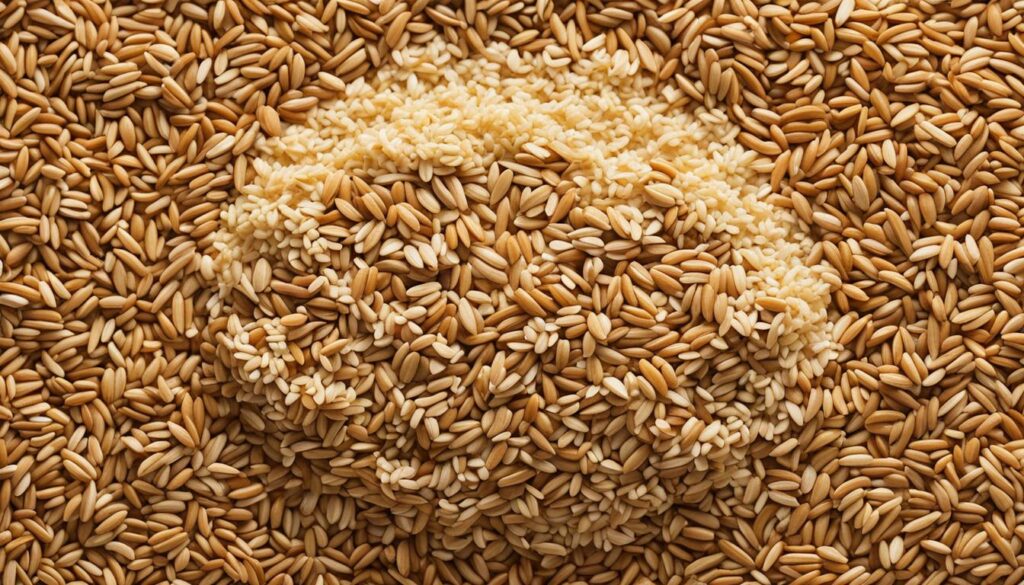Superfoods play a crucial role in supporting brain health and cognition.
By incorporating these nutrient-rich foods into your diet, you can enhance memory, focus, and overall brain function.
Let’s explore the top 10 superfoods that are beneficial for your brain according to scientific research.
Key Takeaways:
- Superfoods are nutrient-rich foods that support brain health and cognition.
- Including these foods in your diet can enhance memory, focus, and overall brain function.
- Scientific research has identified the top 10 superfoods for your brain.
- By incorporating these superfoods into your diet, you can optimize your brain’s full potential.
- Stay tuned to learn about the brain-boosting properties of avocados, whole grains, beans, and more.
Avocados: Enhance Cognitive Function
A 2018 study conducted at Tufts University revealed the remarkable cognitive health benefits of avocados.
The research found that consuming one fresh avocado per day for six months resulted in significant improvements in problem-solving skills and working memory in older adults.
The participants who incorporated avocados into their daily diet experienced enhanced cognitive function compared to the control group.
Avocados are not only delicious but also packed with nutrients that promote brain health. They are rich in healthy fats, specifically monounsaturated fats, which are essential for cognitive function.
These fats are known to improve memory and problem-solving skills by supporting the health of brain cells and the communication between them.
In addition to healthy fats, avocados are a great source of vitamin E, a powerful antioxidant that protects brain cells from damage caused by free radicals.
Vitamin E also plays a crucial role in maintaining brain health and may help prevent cognitive decline as we age.
Furthermore, avocados contain folate, which is necessary for the production of neurotransmitters that regulate mood and memory. Folates also support the development of new brain cells and aid in the repair of existing ones.
Whether enjoyed in salads, sandwiches, or as a flavorful topping, avocados can make a significant impact on cognitive function and brain health. Incorporating these creamy fruits into your daily diet can help improve memory, problem-solving skills, and working memory, ultimately enhancing your overall cognitive abilities.
Whole Grains: Boost Concentration and Focus
Incorporating whole grains into your diet can have numerous benefits for brain function, including boosting concentration and focus.
Not only are whole grains a delicious addition to your meals, but they also play a vital role in promoting cardiovascular health and providing a steady supply of energy to the brain.
One of the key advantages of consuming whole grains is their ability to release glucose slowly into the bloodstream. This regulated energy supply helps keep the brain alert throughout the day, ensuring optimal cognitive function.
Unlike refined grains that cause blood sugar spikes, whole grains provide a sustained release of glucose, leading to improved concentration and focus.
Moreover, whole grains are rich in essential nutrients, including vitamin E, which is known to support overall brain health. Vitamin E acts as a powerful antioxidant, protecting brain cells from oxidative stress and promoting healthy brain function.
By incorporating whole grains into your diet, you can support cardiovascular health, maintain a steady energy supply to the brain, and enhance concentration and focus. These brain-boosting benefits, along with the presence of vitamin E, make whole grains an essential component of a well-rounded diet for optimal brain health.
Benefits of Whole Grains for Brain Health:
- Promote cardiovascular health
- Provide a steady energy supply to the brain
- Enhance concentration and focus
- Support overall brain health
To incorporate whole grains into your diet, consider options such as whole wheat, brown rice, oats, quinoa, and barley. These grains can be enjoyed in various forms, including bread, cereals, pasta, and side dishes.

Including whole grains in your meals not only adds a satisfying texture and flavor but also ensures that you are nourishing your brain for optimal function.
Make whole grains a regular part of your diet and experience the benefits of improved concentration, focus, and overall brain health.
Beans: Stabilize Blood Sugar Levels and Provide Nutrients
Beans are an excellent choice for promoting brain health and cognitive function. These nutrient-dense legumes offer a variety of benefits that support optimal brain function.
Not only do beans provide essential nutrients such as magnesium, zinc, fiber, and antioxidants, but they also play a crucial role in stabilizing blood sugar levels, which is essential for brain health.
When it comes to brain function, beans are particularly rich in folate, a B-vitamin that is vital for neural development and function.
Folate has been linked to improved cognitive performance and may also help protect against age-related cognitive decline.
Moreover, beans provide a steady supply of glucose to the brain, its preferred fuel source, due to their slow digestion. This helps maintain energy levels and supports optimal brain function throughout the day.
To take advantage of the brain-boosting benefits of beans, incorporate different varieties into your diet.
Options such as black beans, kidney beans, pinto beans, and chickpeas can be enjoyed in various recipes, including salads, soups, stews, and dips.
Here are some key nutrients found in beans that contribute to brain health:
- Magnesium: Supports brain function and helps regulate neurotransmitters.
- Zinc: Plays a role in cognitive function, memory, and learning.
- Fiber: Promotes healthy digestion and supports blood flow to the brain.
- Antioxidants: Protect brain cells from damage caused by free radicals.
- Folate: Crucial for brain development and cognitive function.
Next, let’s explore the importance of exercise for brain health and cognitive function.
References:
- Smith, C. E., & Tucker, K. L. (2011). Health benefits of cereal fibre: a review of clinical trials. Nutrition research reviews, 24(1), 118-131.
- Hodgson, A. B., Randeva, H. S., & Voutetakis, A. (2019). Nutritional interventions to reduce cognitive decline: Opportunities and challenges. Frontiers in aging neuroscience, 11, 240.
Exercise and Brain Health
Regular exercise is not only beneficial for the body but also for the brain. Research suggests that engaging in regular exercise improves cognitive function, slows down the mental aging process, and enhances information processing.
Exercise has been shown to stimulate the release of chemicals in the brain that promote the growth of new neurons, improve blood flow, and enhance the connectivity between different regions of the brain. This, in turn, can lead to improved memory, attention, and overall cognitive function.
To reap the brain health benefits of exercise, experts recommend a minimum of 150 minutes of moderate-intensity aerobic activity per week.
This can include activities such as brisk walking, cycling, swimming, or dancing. It’s important to find exercises that you enjoy and can incorporate into your routine consistently.
In addition to aerobic exercise, incorporating strength training exercises into your routine can also support brain health. Strength training has been found to increase the production of neurotrophic factors, which are proteins that promote the growth and maintenance of brain cells.
Exercise not only benefits the brain in the short term but also has long-term effects on cognitive function. It has been shown to slow down the mental aging process, reducing the risk of cognitive decline and neurodegenerative diseases, such as dementia and Alzheimer’s disease.
So, whether it’s going for a jog, practicing yoga, or hitting the gym, making exercise a regular part of your routine can contribute to a healthier brain and improved cognitive function.

The Connection Between Exercise and Brain Health
Evidence shows that exercise not only improves physical fitness but also has a positive impact on brain health and cognitive function. Here are some key findings:
| Benefit of Exercise | Evidence |
|---|---|
| Improved memory and learning | Aerobic exercise has been shown to enhance memory and learning capabilities by increasing the size of the hippocampus, a brain region involved in memory formation. |
| Enhanced mood and reduced stress | Exercise stimulates the release of endorphins, neurotransmitters that promote feelings of happiness and well-being. It also helps reduce stress by decreasing the production of stress hormones. |
| Increased attention and focus | Engaging in regular exercise improves attention and focus by increasing blood flow to the brain and enhancing the connectivity between different brain regions. |
| Protection against cognitive decline | Studies have shown that individuals who exercise regularly have a lower risk of developing cognitive decline and neurodegenerative diseases, such as Alzheimer’s disease. |
Additional Tips for Optimizing Brain Function
In addition to maintaining a healthy diet and exercise routine, there are several other strategies you can implement to optimize your brain function.
By adopting these habits, you can enhance your cognitive abilities and improve overall brain health.
Eating Habits: Fueling your brain with the right nutrients is crucial for optimal function. Incorporate brain-boosting foods such as avocados, whole grains, and beans into your diet. These superfoods provide essential vitamins, minerals, and antioxidants that support memory, focus, and cognitive performance.
Sleep: Quality sleep is essential for your brain to rest, recharge, and consolidate memories. Aim for 7-9 hours of uninterrupted sleep each night. Establish a bedtime routine, create a conducive sleep environment, and limit exposure to electronic devices before bedtime.
Hydration: Staying hydrated is key to maintaining optimal brain function. Dehydration can impair cognitive abilities, attention, and mood. Aim to drink at least 8 glasses of water per day to ensure proper hydration.
Stress Reduction: Chronic stress can have a detrimental impact on brain health. Engage in stress-reducing activities such as yoga, meditation, or deep breathing exercises. These practices help relax the mind, reduce anxiety, and improve overall cognitive function.
Alcohol Intake: Excessive alcohol consumption can adversely affect brain function. Limit alcohol intake and practice moderation to protect your brain health. If you choose to drink, do so in moderation and be mindful of the potential risks.
Brain Power Supplements: Consider incorporating brain power supplements into your routine.
These supplements, such as omega-3 fatty acids, vitamin D, and ginkgo biloba, are known for their potential to enhance brain function. Consult with a healthcare professional to determine the right supplements for your needs.
“Optimizing brain function involves adopting healthy habits, such as maintaining a balanced diet, getting enough sleep, staying hydrated, reducing stress, moderating alcohol intake, and considering brain power supplements.”
Img:
Conclusion
Prioritizing brain health is crucial for maintaining optimal cognitive function. By incorporating superfoods into your diet, you provide the essential nutrients needed to support brain health and enhance cognitive abilities.
Avocados, whole grains, beans, and other brain-boosting foods offer numerous benefits for memory, focus, and overall brain function.
Research has shown that avocados, rich in healthy fats and vitamin E, can improve problem-solving skills and working memory.
Whole grains, with their slow release of glucose and vitamin E content, help boost concentration and focus by providing a steady energy supply to the brain.
Beans, known for stabilizing blood sugar levels, are nutrient-dense and contain folate, magnesium, zinc, and antioxidants that support brain function.
In addition to incorporating superfoods, regular exercise plays a vital role in brain health and cognitive function. Engaging in at least 150 minutes of exercise per week can improve cognitive abilities, slow down the mental aging process, and enhance information processing.
It is also essential to consider other lifestyle factors such as maintaining balanced eating habits, getting enough quality sleep, staying hydrated, reducing stress, limiting alcohol intake, and exploring brain power supplements to optimize brain function.
By adopting a holistic approach that combines a diet rich in brain-boosting superfoods, regular exercise, and a healthy lifestyle, you can unlock your brain’s full potential.
Prioritizing brain health leads to optimal cognitive function, allowing you to thrive in various aspects of life.
FAQ
What are the top superfoods for brain health?
The top superfoods for brain health include avocados, whole grains, beans, and more. These nutrient-rich foods provide essential nutrients that support cognitive function and enhance brain health.
How can avocados enhance cognitive function?
Avocados are rich in healthy fats, vitamin E, and other nutrients that promote brain health and improve cognitive abilities.
Research has shown that consuming avocados regularly can result in significant improvements in problem-solving skills and working memory.
What benefits do whole grains offer for brain health?
Whole grains promote cardiovascular health and provide a steady supply of energy to the brain. They release glucose slowly into the bloodstream, ensuring a regulated energy supply that keeps the brain alert. Additionally, whole grains contain vitamin E, which supports overall brain health.
How do beans support brain function?
Beans are an excellent brain-friendly food due to their slow digestion, nutrient density, and ability to stabilize blood sugar levels.
They provide the brain with its preferred fuel, glucose, and contain essential nutrients such as magnesium, zinc, fiber, antioxidants, and folate, which are crucial for brain function.
How does exercise contribute to brain health?
Regular exercise improves cognitive function, slows down the mental aging process, and enhances information processing. It is recommended to engage in at least 150 minutes of exercise per week to support brain health and overall well-being.
What are some additional tips for optimizing brain function?
In addition to a healthy diet and exercise, maintaining balanced eating habits, getting enough quality sleep, staying hydrated, reducing stress through practices like yoga or meditation, limiting alcohol intake, and considering brain power supplements can all contribute to maximizing cognitive abilities.
Why is brain health important?
Prioritizing brain health is essential for maintaining optimal cognitive function. By incorporating superfoods into your diet and adopting a healthy lifestyle, you can provide the necessary nutrients to support brain health and enhance cognitive abilities.




